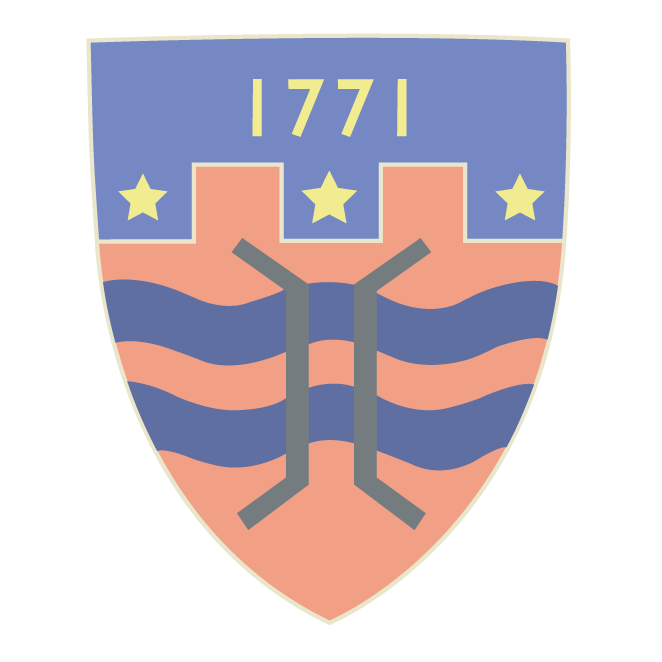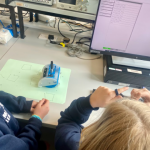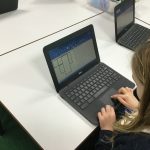At St. Oswald’s we recognise that our children are growing up in an ever changing world where new technology is constantly being developed and used every day and new jobs within Technology are being created. With this in mind, we understand how important it is for our pupils to experience a rich and engaging Computing curriculum to ensure they are prepared for the future.
Statement of Intent
Our Computing curriculum enables pupils to develop skills to prepare them for the digital world. It is approached in a practical child centred manner, which makes it accessible to all pupils. From Reception to year 6, all of our pupils expand their knowledge and understanding of the world by being actively involved in experiencing, investigating, manipulating, and using information and technology in a variety of forms including; text, symbols, sound, graphics, photographs, music and video and most importantly we strive to develop pupils’ Computational thinking!
For most of us, technology is essential to our lives, at home and at work. So we believe that ‘Computational thinking’ is a skill all children must be taught if they are to participate effectively in this digital world. Why is computational thinking so important? It allows us to solve problems. It gives us the skills necessary to engage and interact with the world. It enables us to be logical and strategic thinkers and problem- solvers in many areas of our lives.
The National Curriculum for Computing is divided into 3 strands:
- Computer Science: This is the core of computing, in which pupils are taught the principles of information and computation, how digital systems work and how to put this knowledge to use through programming.
- Information Technology: pupils are equipped to use information technology to create programs, systems and develop a range of content.
- Digital Literacy: Computing also ensures that pupils become digitally literate – able to use, and express themselves and develop their ideas through information and communication technology. Within digital literacy, we cover Internet Safety where pupils are taught how to keep themselves safe when using the internet to support them in becoming responsible global citizens.
Implementation
To meet our intent and provide a meaningful, up-to-date curriculum, we have implemented the following actions:
- A clear and effective cross curricular mapping of curriculum statements that provides coverage in line with the National Curriculum is in place across every phase at St Oswald’s.
- Teaching and learning facilitates progression across all key stages within the strands of digital literacy, information technology and computer science.
- Resources are available to aid in the acquisition of skills and knowledge.
- Children have access to the hardware (computers, chromebooks, ipads, programmable equipment) and software that they need to develop knowledge and skills of digital systems/programmes and their applications.
- Children have the opportunity to explore and respond to key issues such as digital communication, cyberbullying, online safety, security, plagiarism and social media.
- Staff have up to date knowledge of the Computing Curriculum and are offered frequent opportunities to develop their own subject knowledge in this ever changing area of the Curriculum.
- Lessons are planned reflecting on going assessment, to ensure progression for all and that all students are able to access the Curriculum.
- Wider Curriculum links and opportunities for the safe use of digital systems are considered in wider curriculum planning.
- Parents are informed when issues relating to online safety arise and further information/support is provided if required.
- As well as opportunities underpinned within the curriculum, children will also spend time further exploring the key issues associated with online safety.
Impact
Successfully implementing our effective curriculum ensures:
- All children will be confident users of technology, able to use it to accomplish a wide variety of goals, both at home and in school to prepare them for jobs which are yet to be invented due to technological advancements.
- All children will have a secure and comprehensive knowledge of the implications of technology and digital systems. This is important in a society where technologies and trends are rapidly evolving.
- All children will be able to use technology safely and securely to help them develop their skills and prepare them for the digital world when they leave primary school.
Online Safety
At St Oswald’s, online safety is woven throughout our curriculum. Through tailored lessons, focus weeks, collaboration with external agencies and the delivery of our effective Computing curriculum, St Oswald’s strives to prepare children for safe and responsible online use. We understand that computer technology is an essential resource for supporting teaching and learning. The internet, and other digital and information technologies, open up opportunities for pupils and play an important role in their everyday lives. Whilst the school recognises the importance of promoting the use of computer technology throughout the curriculum, we also understand the need for safe internet access and appropriate use.
Each year, children revisit prior learning and awareness whilst developing their awareness further with age appropriate content. The focus of each year group, alongside revisiting previous learning is represented within our curriculum overview.
We appreciate that parent/carers may also need support in acting on online issues. As a school, we are always here to support but there is further guidance on the links below:




